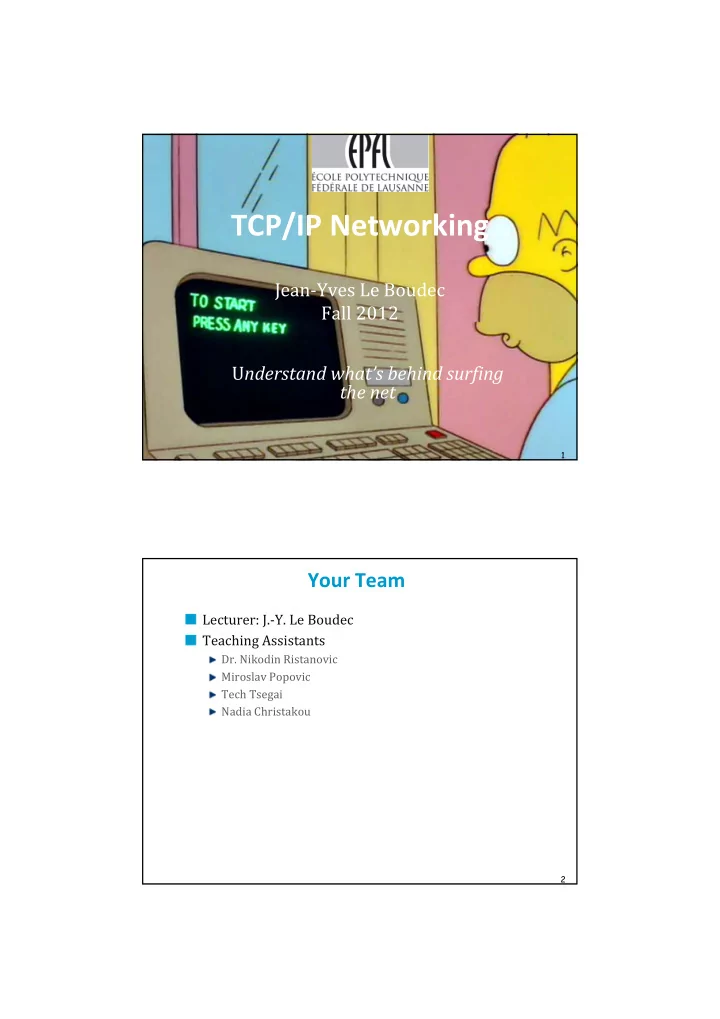

TCP/IP Networking Jean‐Yves Le Boudec Fall 2012 U nderstand what’s behind surfing the net 1 Your Team Lecturer: J.‐Y. Le Boudec Teaching Assistants Dr. Nikodin Ristanovic Miroslav Popovic Tech Tsegai Nadia Christakou 2
Organization Lecture Slot : 12:15 – 14:00 Exercise Slot : 14:15 – 16:00 14:15 – 16:00 exercises or lecture or lab Second lab slot to be defined with TAs for labs 1 to 3 Lectures 2 hours every week Exceptionally this week and 3rd week : lecture 12:15 to 16:00 See moodle for the complete plan http://moodle.epfl.ch/course/view.php?id=523 Key given in class Use forum, no email except for private issues 3 Grading � � 0.2 � � 0.1 � � 0.7 � � � � � lab grade � � clicker test grade � � final exam � � research exo bonus (oral presentation) 4
Labs 5 labs: Exploration Debugging Congestion Control Interior Routing Exterior Routing Mandatory Graded � � � � � 2�� � � � � � � � � � � � 9 In special rooms, see next presentation and Moodle 5 Final Exam One final exam in exam session See last year’s exams on moodle One recap session towards end of course All tests/exams are written, closed book, no electronic equipment The “exam booklet” is allowed 6
Clicker Tests Tests with clickers 8 tests in total Mandatory, but … Best 6 tests used for grading No replacement if sick or other excuse All tests/exams are written, closed book, no electronic equipment except clickers The “exam booklet” is allowed 7 Paper and Pencil Exercises In class (exercise slot, 14:15 to 16:00), not graded 2 sessions in total Week 6: level setting Week 11: exam prep 8
Research Exercise Optional, for those highly motivated by the topic Self‐study You are asked to study a question (see web site), based on documents available in the Internet You hand in a research exercise report Graded as joker: min �� ��� � � replaced by RR The 2 best results at research exercise tests are allowed to give a presentation to the class Presentation is graded RP increase your final grade by +0.0 (�� � 1) to +0.25 (�� � 6) 9 Escape Clause Some of you had a bachelor course on TCP/IP networking They can try to escape the first module of the course Take the escape test (today at 14:15 in INM 201) If test successful you are allowed to: Skip lectures Module 1 Do research exercise now � � and � � grades replaced by escape test E and research exercise report grade RR 10
Roadmap Module 1 Lab 1 Escape Test E TCP/IP Lab 2 Research Exercise architecture Module 2 Lab 3 Congestion Control Module 3 Lab 4 Routing Lab 5 Module 4 (Weird Things) Research Exercise MPLS, Multicast (Option) 11 Grading – all details � � 0.2 � � 0.1 � � 0.7 � � � � � � max�� � , �� � �� � average of 4 largest grades in �� � , … , � � , ��� � � ��� �� � � � � � average of 6 largest grades in �� � , … , � � � � � �� � 1 � 0.05 All grades except � are unrounded � : escape test � � … � � : labs � � … � � : clicker tests �� : research exo written report �� : research exo oral presentation (if admitted) 12
Courseware Textbook “Computer Networking : Principles, Protocols and Practice”, by O. Bonaventure, open source textbook, http://inl.info.ucl.ac.be/CNP3 Module 2: “Rate adaptation, Congestion Control and Fairness: A Tutorial” by JY Le Boudec, on moodle and on the web http://ica1www.epfl.ch/PS_files/ LEB3132.pdf Slides on Moodle Lab and Research exercise material on Moodle 13 The RAKE philosophy « I want this course to teach me all the details of all networking protocols » ex: how to setup my NAT on my ADSL modem Viewpoint 2: « TCP/IP is a mountain of details, I will learn when and if the need arises » thus I do not need this course We will use the RAKE philosophy ‐ Depth in carefully selected labs ‐ Extrapolation (Research Exercise) 14
Learn by both Examples and Concepts Computer networking is ≈ 50 years of design experience First paper on packet switching: 1961 (Kleinrock) First router built (connection oriented): 1969 (ARPAnet) TCP/IP is not a random collection of protocols, it is based on a few ideas in this course we will learn the concepts “The devil’s in the detail” it is easy to misunderstand concepts if you do not have practical experience: ex: difference between a router and a bridge ? in this course we will gain practical experience by carefully selected practical 15 What, Why, How I will try and teach you to always ask first Why was this stuff invented, what problem is it solving ? What is it doing? before asking: How does it do its job ? This is important if you plan to become a technical leader or manager ! 16
After this Course You will know enough concepts and have enough practical experience to undertake a project that uses TCP/IP look credible at a technical meeting (ex: IETF meeting) quickly learn by yourself the details you need to know, when you need to know them 17
Recommend
More recommend